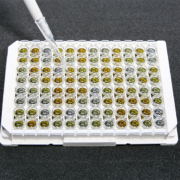Multiparametric autoantibody detection in autoimmune bullous dermatoses
Autoantibodies against BP180, BP20, collagen type VII, desmoglein 1 and 3 and envoplakin can be detected simultaneously using a new multiparameter ELISA profile, considerably facilitating the diagnosis and differentiation of autoimmune bullous dermatoses (AIBD). The six autoantibodies are detected with high sensitivity and specificity using recombinant fragments of the immunodominant regions of the different target antigens. Each antigen is present in a separate well of the ELISA strip, providing convenient parallel analysis. In clinical evaluation, sensitivities of between 60% (anti-BP230 in bullous pemphigoid) and 100% (anti-desmoglein 3 in pemphigus vulgaris) and specificities of between 97.3% (anti-BP180 NC16A) and 100% (anti-collagen VII) were obtained with sera from patients with different AIBD and negative controls. In a further, prospective study using consecutive sera from patients with suspected AIBD, the ELISA yielded an agreement of 87% with conventional stepwise diagnostics (histology, direct and indirect immunofluorescence on biopsies and skin substrates, as well as monospecific tests like ELISA or immunoblots with cellular extracts). Discrepant results were attributed to the absence of certain target structures (e.g. p200 antigen, BP180 ectodomains) and the lack of IgA autoantibody detection. AIBD diseases are rare diseases of the skin and mucous membranes. The detection of circulating autoantibodies has in recent years become a central tenet of diagnosis and differentiation of AIBD. Antibodies against BP180 and BP230 occur in pemphigoid diseases, antibodies against desmoglein 1 and 3 and against envoplakin in pemphigus diseases, and antibodies against type VII collagen in acquired epidermolysis bullosa. Analysis of the six autoantibody specificities with the multiparameter profile ELISA allows diagnosis of 91% of pemphigus and around 76% of pemphigoid diseases in one step.



